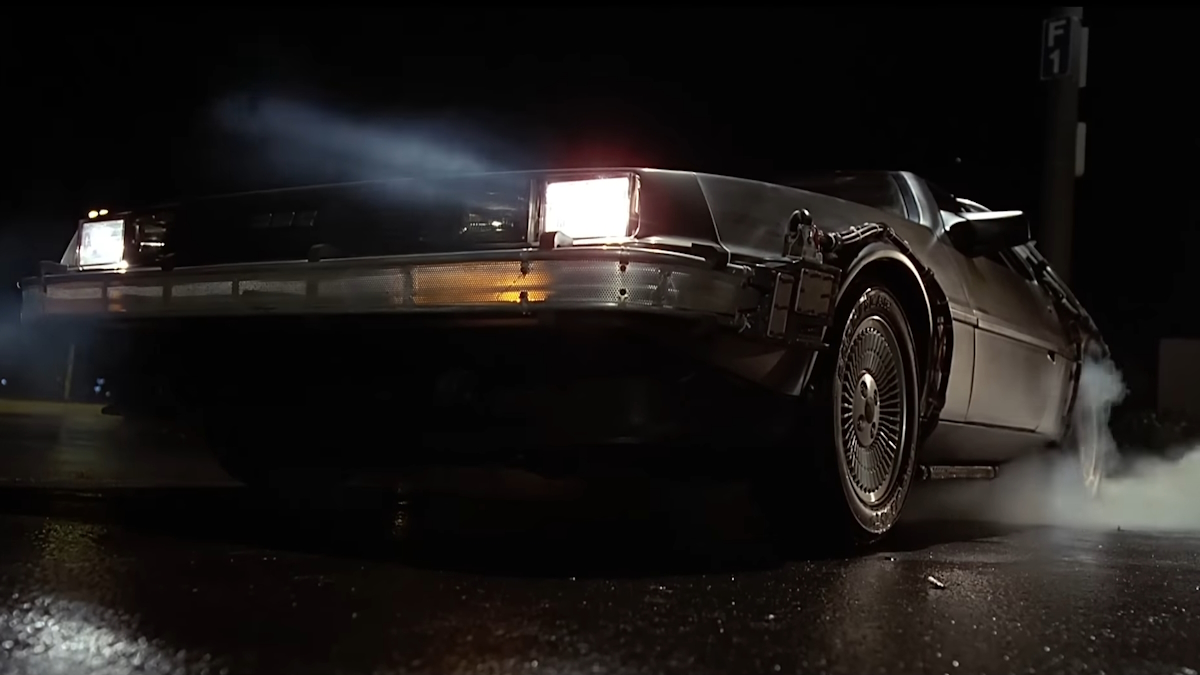
In the same way dogs can resemble their owners, in movies, cars can tell you something about their drivers. But which cars are actually the most iconic in movies?
Throughout the 20th century, both the film and automobile industries experienced parallel growth and evolution. Both started out as niche interests, until their widespread adoption coincided with rapidly changing lifestyles. As more families bought more cars, that gave them the power to indulge in certain pastimes – like seeing more movies. Along the way, advancing technology and plain old human ingenuity changed the way both things were made forever.
The history of movies is simply full of great cars. Whether it’s due to a movie’s sense of romance and adventure, or just the way cars are captured on camera, some movies have the power to make a specific car desired forever. In a lot of ways, driving an iconic car feels like stepping into the movie yourself.
From import tuners driven by punk teenagers to luxury cars driven by handsome spies, these are the 32 most iconic cars in movies.
32. Toyota Sprinter Trueno AE86 (Initial D, 2005)
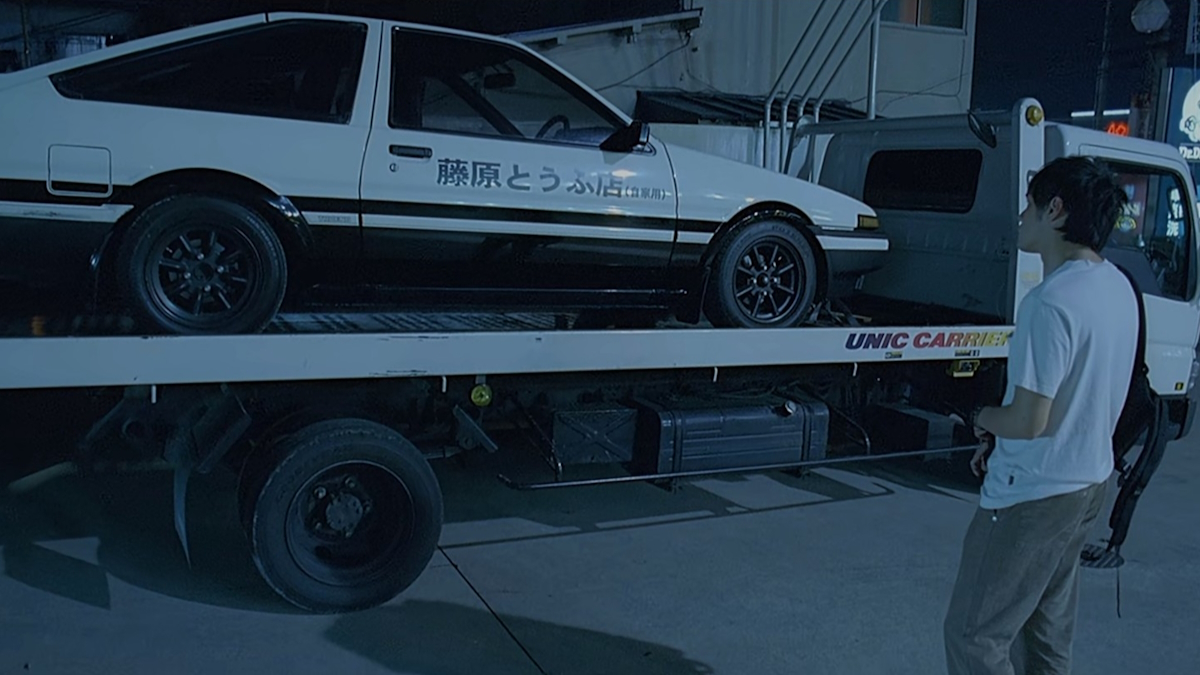
In its debut in the 1980s, the Toyota AE86 was favored among Japanese motorsportists for its drifting capabilities. But the AE86 found permanent reverence for its central role in the Japanese anime and manga series Initial D about street racers who light up the winding roads of Mount Akina. In 2005, Initial D was adapted to the screen by Hong Kong filmmakers Andrew Lau and Alan Mak, with Taiwanese pop star Jay Chou in his acting debut. In Initial D, an aloof teenager (Chou) smokes Japan’s most feared racers using his dad’s lame car, which he primarily uses for tofu delivery runs. With its plain but versatile black and white colorway and restaurant decal on its side door, the AE86 is a metaphor for Initial D’s core message: It’s not the engine under the hood that matters, but the driver behind the wheel that counts.
31. 1971 Chevrolet Nova SS, aka “Death Proof” (Death Proof, 2007)
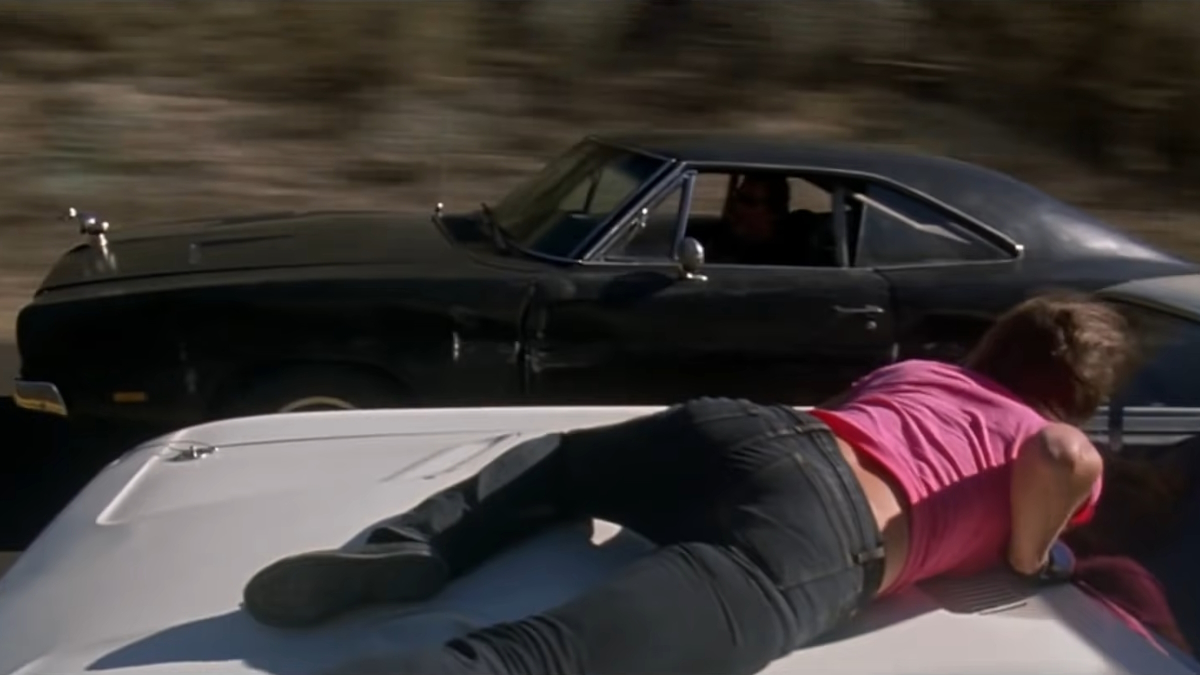
It’s a car that guarantees immunity from death – you just have to be in the driver’s seat. In Quentin Tarantino’s Death Proof, which makes up one half of the Grindhouse double bill (with Robert Rodriguez’s Planet Terror), Kurt Russell plays a Hollywood stuntman and serial killer who targets beautiful women in his customized 1970 Chevrolet Nova SS (for “Super Sport”). With a memorable matte black paint job and a white skull painted on the hood, the “Death Proof” is like a pirate flag on rubber wheels, with a threatening vibe that feels like an extension of its sinister owner.
30. Audi R8 Model 2008 (Iron Man, 2008)
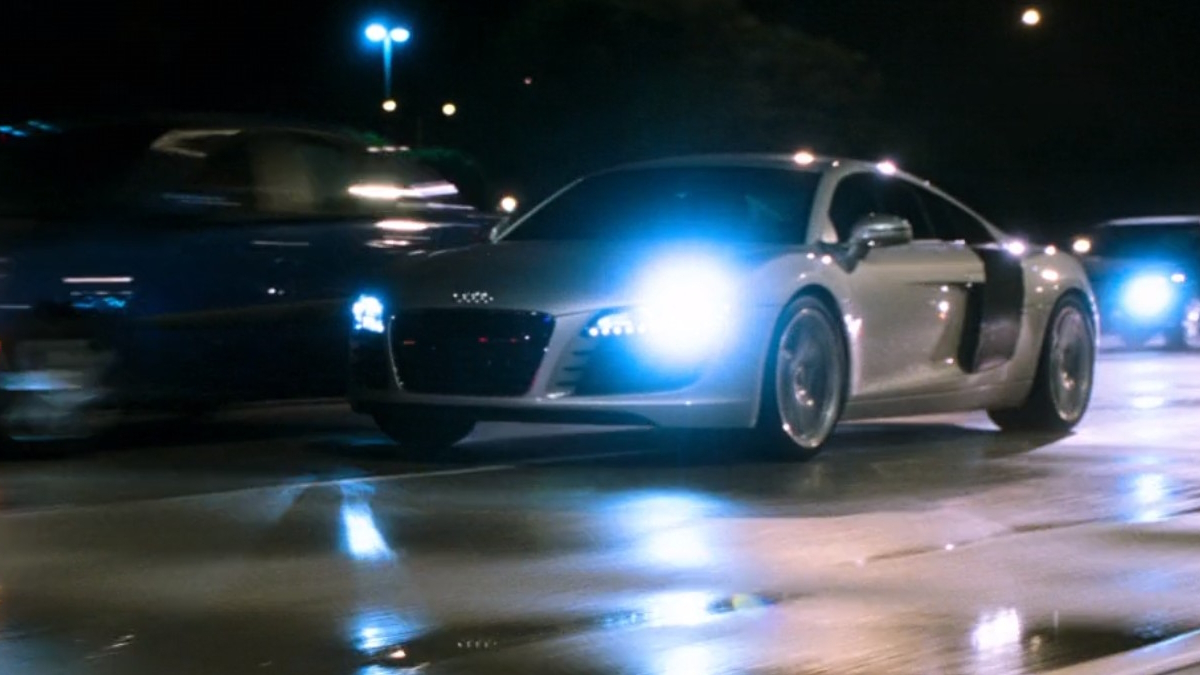
When the Marvel Cinematic Universe launched with Iron Man, Tony Stark arrived in style behind the wheel of the Audi R8. Appropriately sporty and expensive, the car lives up to the playboy lifestyle of a wealthy industrialist like Tony Stark, never mind that electric vehicles might better appeal to Tony’s technical brain. Born out of a product placement deal for Marvel Studios’ first movie, the Audi R8 now enjoys iconic status as Iron Man’s car. Any time Iron Man is in a Marvel movie, you can bet his R8 is parked nearby.
29. 1973 Chevrolet Malibu (Drive, 2011)
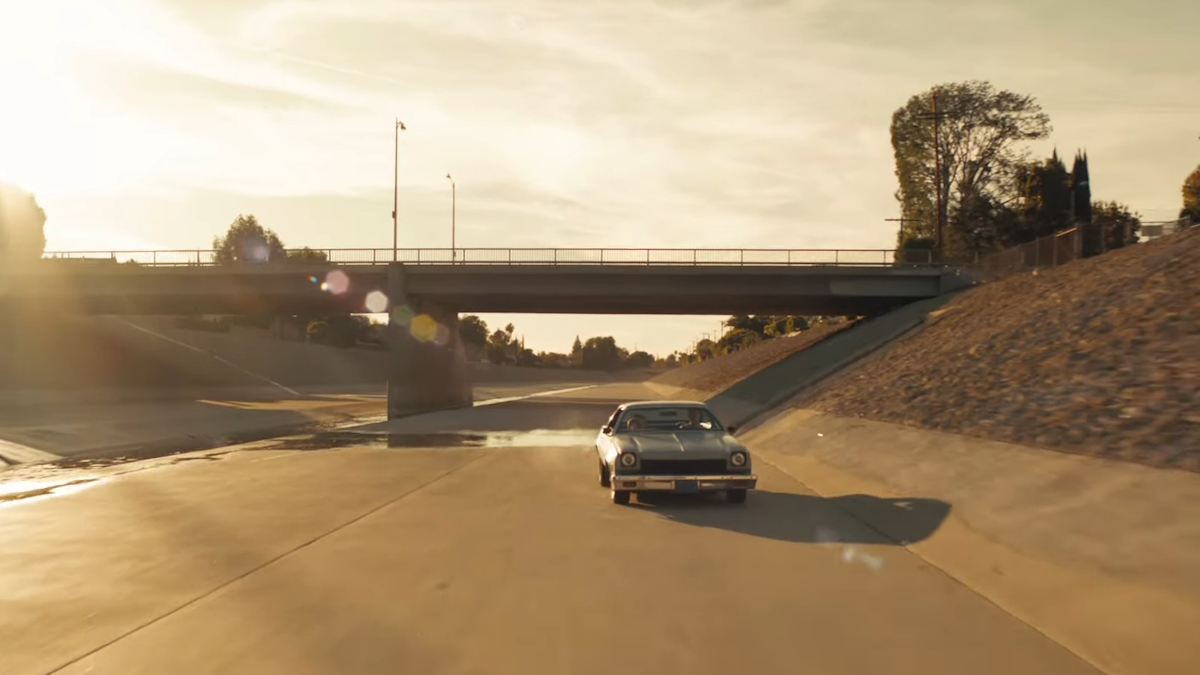
In Nicolas Winding Refn’s neo noir classic Drive, Ryan Gosling plays a nameless mechanic in Los Angeles whose exceptional driving skills net him work by Hollywood movie studios and the criminal underworld alike. His personal ride is a 1973 Chevy Malibu, which Gosling actually took apart and put back together himself during production. Ironically, Gosling’s character rarely uses his own car for his jobs. While that’s just logical, that also means the only time audiences see him drive his Malibu are when he takes a beautiful single mother (played by Carey Mulligan) and her son on sun-dabbled afternoon joy rides around the City of Angels.
28. 1932 Ford Coupe, aka “Milner’s Coupe” (American Graffiti, 1973)
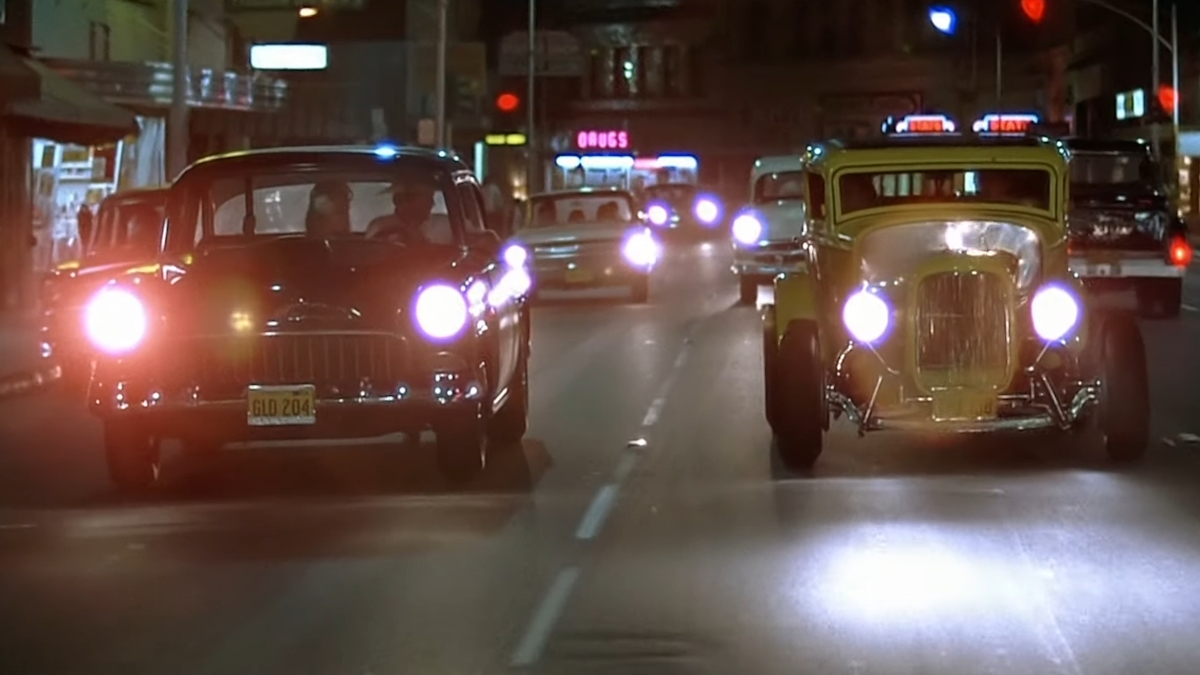
Before George Lucas took audiences to a galaxy far, far away, he took them to his California hometown of Modesto with his movie American Graffiti, inspired by his own adolescence in the ‘60s. In its story of California hot rodders, the car that stands out from the movie’s other Hot Wheels is the now-iconic yellow Ford “Little Deuce Coupe” belonging to street racer John Milner (played by Paul Le Mat). While the vehicle was bought by a producer from a used car lot, it was Lucas himself who modified it (Lucas loves cars, remember) with his finishing touch being a crude coat of yellow lacquer paint that is now associated with the vehicle. It doesn’t matter where you’re from, one glance at Milner’s Coupe can stir wistful nostalgia for an America that’s long gone.
27. 2006 Subaru WRX (Baby Driver, 2017)
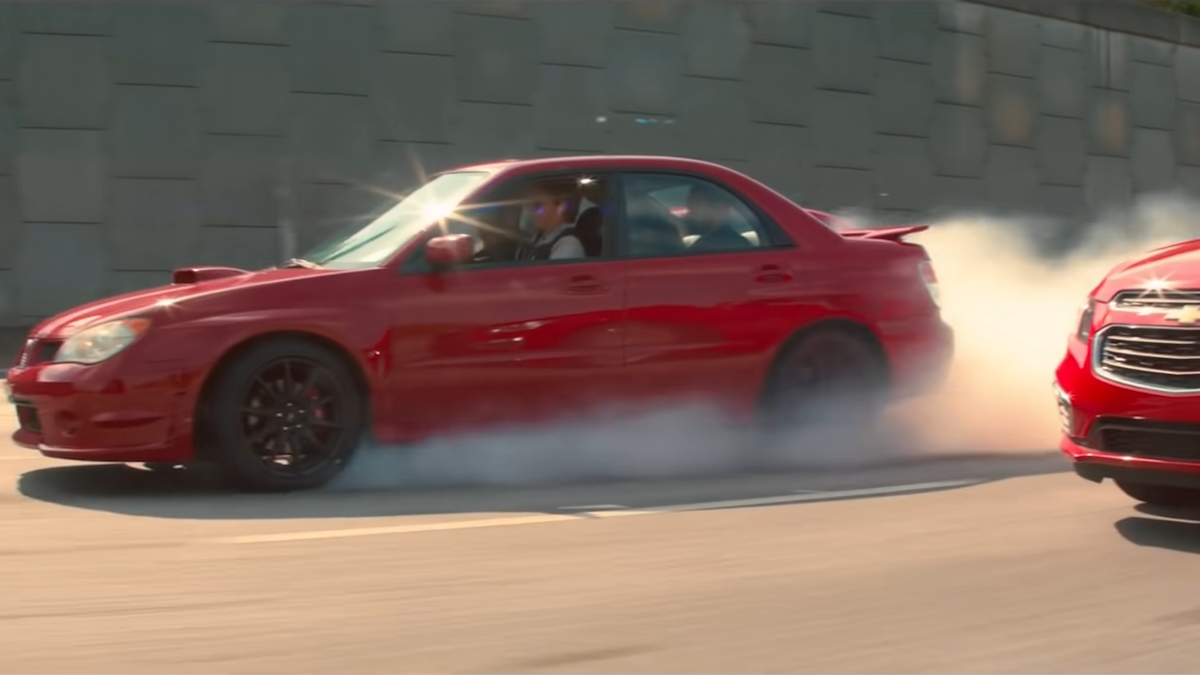
Edgar Wright’s propulsive crime action-comedy Baby Driver, released in 2017, prominently features a vivid red 2006 Subaru WRX driven by disabled getaway driver Baby (Ansel Elgort). In the movie, characters reason that a Subaru is the type of car people have trouble picking out in a parking lot, making it ideal for bank robbers to make their escape. In a case where studio meddling actually yielded good ideas, the car was chosen after Wright was compelled to pass on a Toyota Corolla like he originally wanted, “because the studio asked me if the car could be a little sexier,” Wright told the New York Times in 2017.
26. 1960 Ford Anglia 105E, aka “The Flying Ford” (Harry Potter and the Chamber of Secrets, 2002)
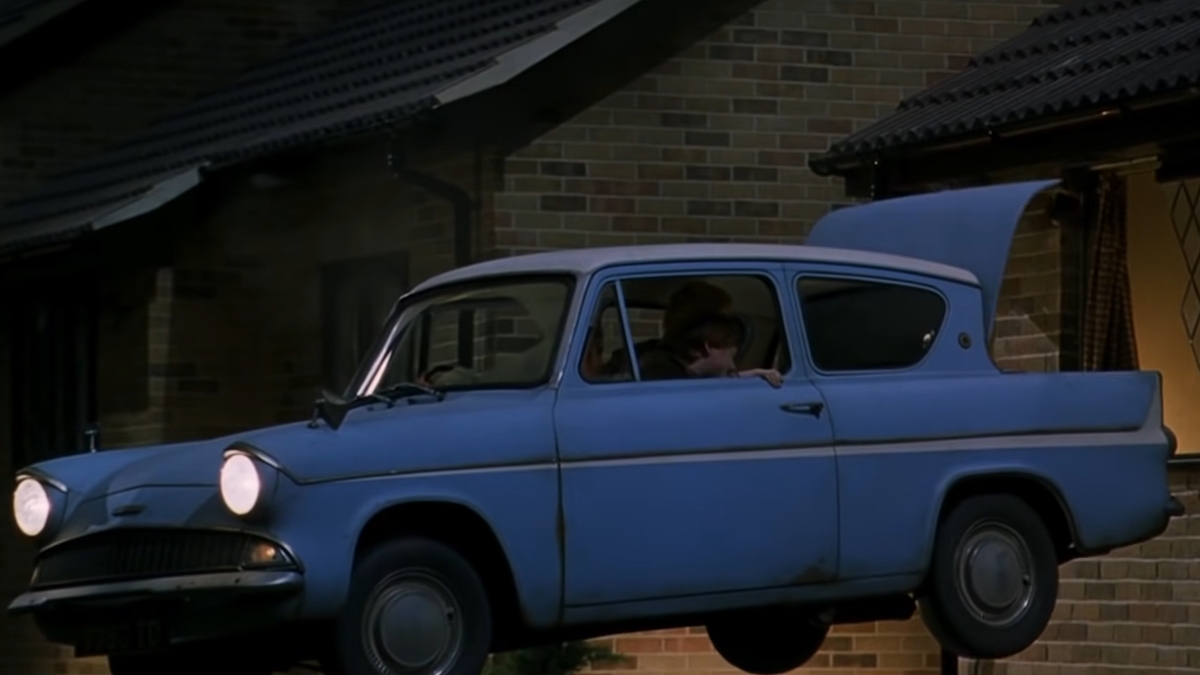
Even wizards can’t resist tricking out cars. In the 2002 Harry Potter sequel, Ron Weasley picks up – or rather, breaks out – Harry from home to start a new year at Hogwarts. He does so using his dad’s car, an early 1960s Ford Anglia that has been illegally enchanted to fly. The car itself descends from Ford’s Anglia series, which were made for European and Australian markets. In a 2004 interview with Wales Online, author J.K. Rowling said she was inspired to feature a turquoise Ford Anglia based on a friend, who had one and took her on joyrides during their teen years. “That turquoise and white car meant freedom and no more having to ask my father to give me lifts, which is the worst thing about living in the countryside when you are a teenager,” Rowling said. “Harry was rescued by that car, just as the car rescued me from my boredom.”
25. 1967 Shelby GT500, aka “Eleanor” (Gone in 60 Seconds, 2000)
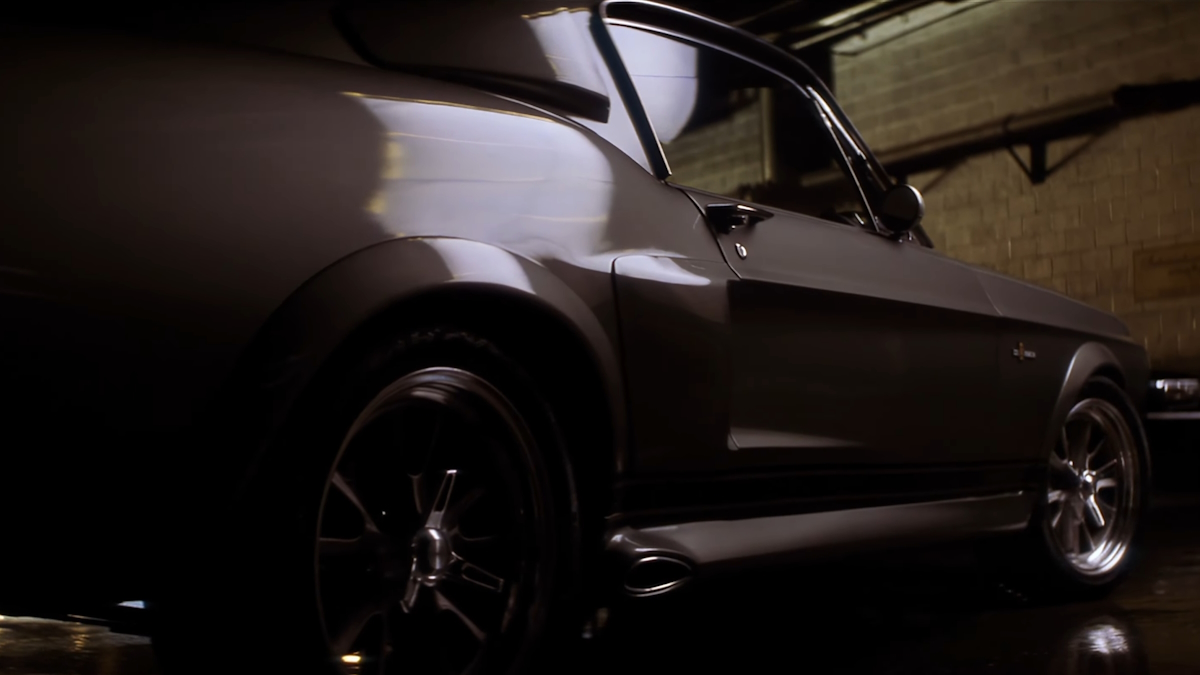
In the original Gone in 60 Seconds released in 1974, the prize car “Eleanor” was a yellow Ford Mustang. For the 2000 remake starring Nicholas Cage, Eleanor got a sleek and steely makeover that not only appealed to the tastes of a new generation, but rose its own profile in the annals of car movie history. Now in a stunning gunmetal gray and using the body of a 1967 Ford Mustang Fastback (despite the movie depicting it as a Shelby GT500 onscreen), Cage roars all throughout Long Beach in a beautiful beast of a vehicle.
24. 1967 AMC Pacer, aka “Mirthmobile” (Wayne’s World, 1992)
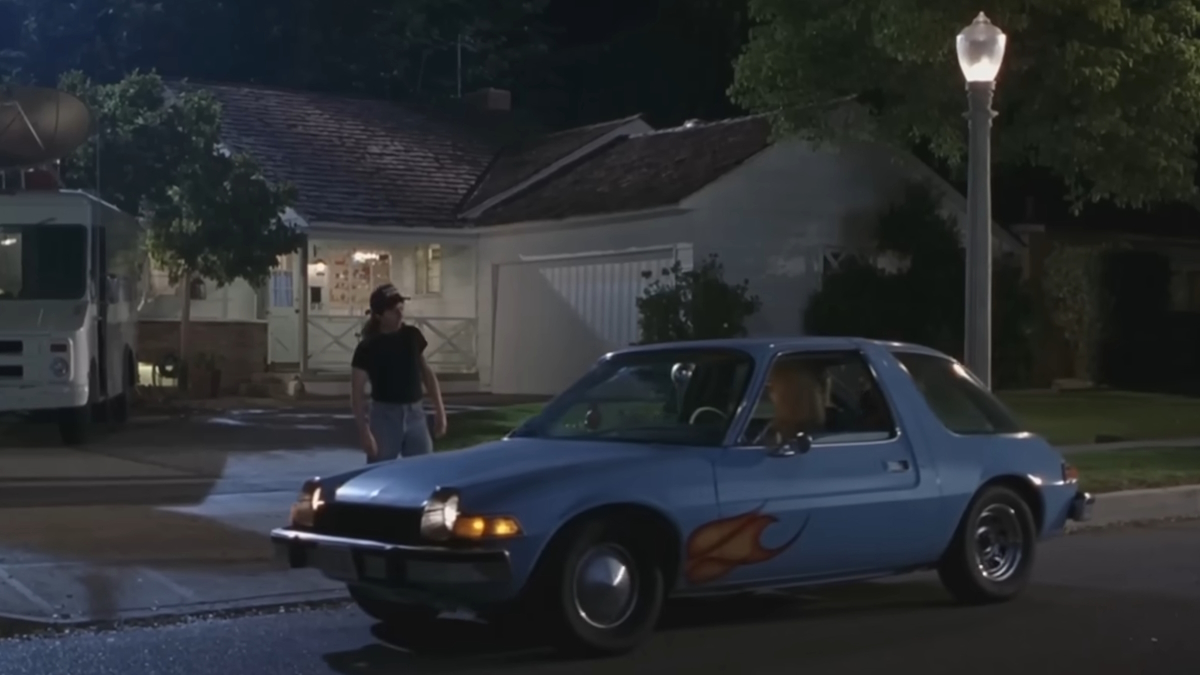
Let’s be real: The “Mirthmobile,” which Wayne and Garth drive while lip-syncing “Bohemian Rhapsody” to kick off Wayne’s World, is a butt ugly thing. It has an odd silhouette that is neither sporty nor classy, while Garth’s version looks sick (in like a Bubonic Plague sort of way) with a pale blue paint job and laughably weak orange flames painted on the mismatched front wheels. But because Wayne’s World is a ‘90s classic, there’s no doubt people out there want to rock out in these anyway. In fact, one lucky person gets to. In 2022, the original screen-used Mirthmobile was sold at auction for $71,500.
23. 1973 Ford Gran Torino (The Big Lebowski, 1998)
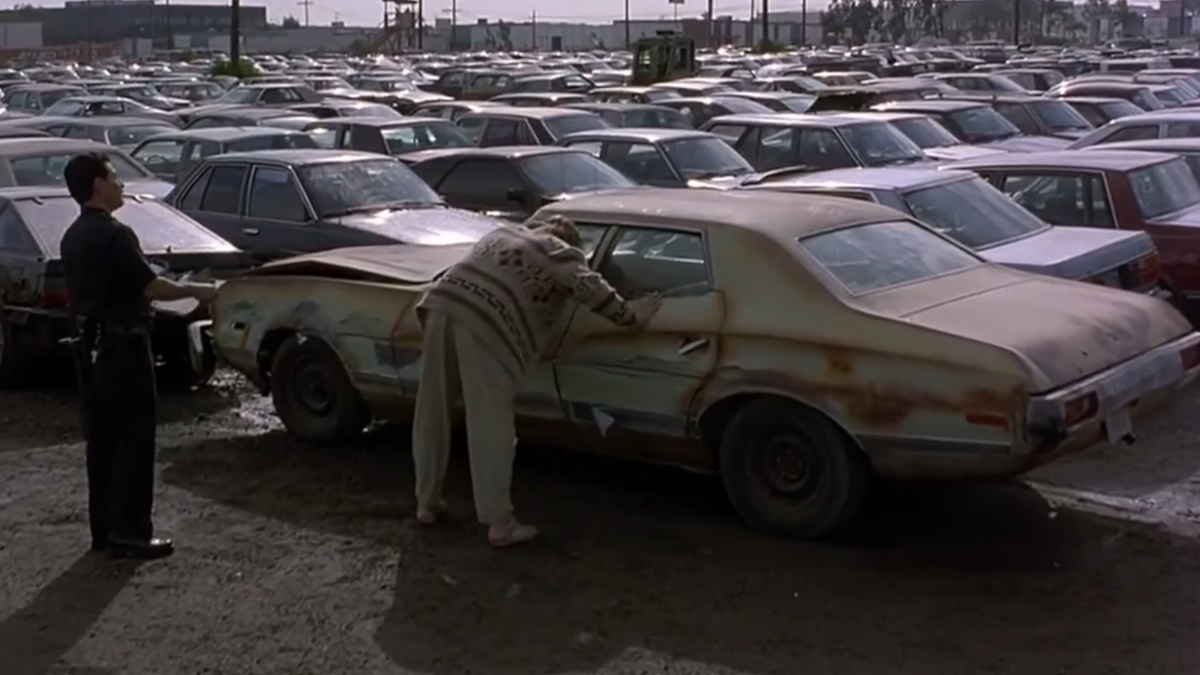
In a famous example of the car matching its owner, Jeff Bridges’ “The Dude” drives an aged, beat-up ‘73 Ford Gran Turino (which has an extensive Creedence Clearwater Revival tape collection). Like The Dude himself, his Gran Torino doesn’t care much for appearances. In its heyday the Gran Torino was a respected car, popular among men who revered its masculine features including a strong engine and attractive design. But now after all these years, life has taken its toll and this Gran Torino is still trying to hold itself together. While it’s totally worn out on the outside, inside, there’s still enough heart and soul to keep things running.
22. 1997 Mazda RX-7 (The Fast and the Furious: Tokyo Drift, 2006)
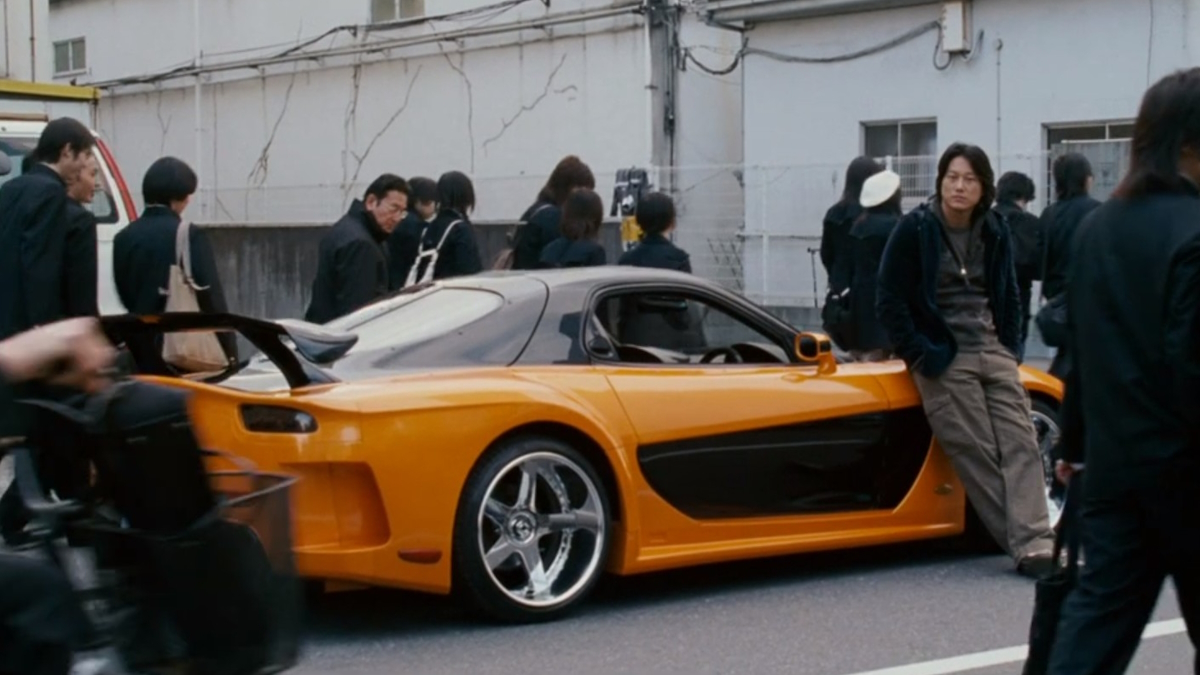
In an action film franchise all about cars, it’s surprising that only a few vehicles actually stand out in the garage. Case in point: Han’s Mazda RX-7 has slowly earned iconic status, partly because of the way it plays a grim role in the saga. Introduced in Justin Lin’s 2006 sequel Tokyo Drift, this custom Mazda is the car Han (Sung Kang) drives throughout the movie until his death towards the climax. Years later in 2013, Fast & Furious 6 revealed in a post-credits scene that Han’s crash wasn’t a freak accident, but an intentional T-bone by new villain Owen Shaw (Jason Statham). While Han has inexplicably returned from the dead in the Fast Saga, his car has been lost to the scrap heap.
21. 1949 Mercury Eight (Rebel Without a Cause, 1955)
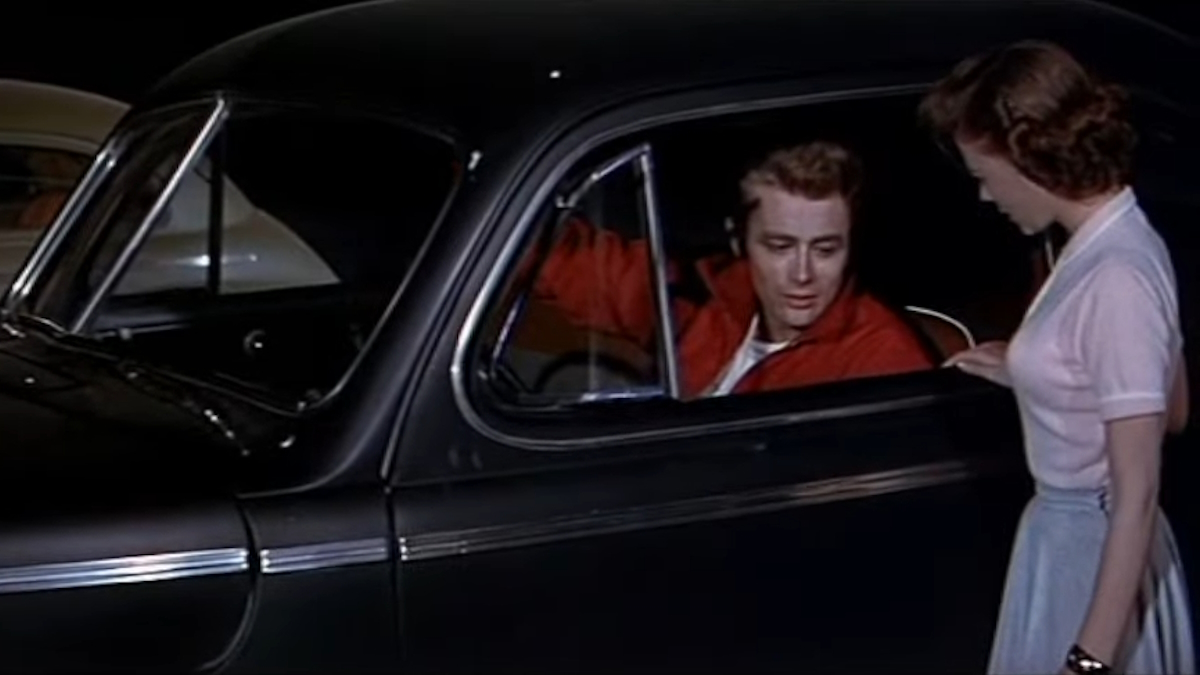
It’s admittedly macabre to remember that Hollywood star James Dean died in a car accident, and that one of his most celebrated posthumous movies sees him drive everywhere. But like his lush hair and red jacket becoming touchstones for 1950s teenage melodrama, so has his beautiful black 1949 Mercury Eight become a symbol of young adult independence. The Mercury Eight was first marketed as a family vehicle but won over enthusiasts for its hot-rodding potential. That spirit eerily suits James Dean’s character, who on the outside lives a safe life in the suburbs but is frighteningly complex underneath the hood. While Rebel Without a Cause is not a racing movie, the movie’s “Chicken Run” scene features visual language that laid the foundations for future hits like Fast & Furious.
20. 1966 Ford Thunderbird (Thelma & Louise, 1991)
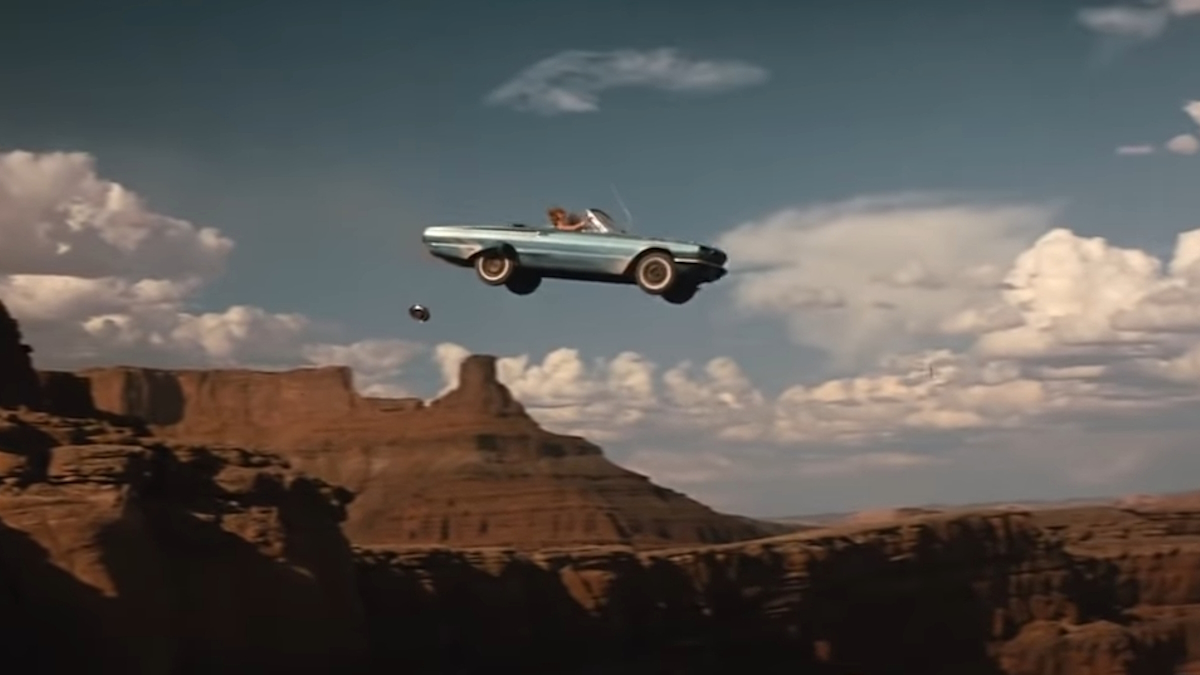
Do they live? Do they die? Does it matter? In Ridley Scott’s 1991 crime dramedy Thelma & Louise, Susan Sarandon and Geena Davis play best friends who hit the road in a gorgeous metallic blue-green 1966 Ford Thunderbird. Like Easy Rider before it, Thelma & Louise is full of breathtaking imagery of America’s wide open highways. But the movie is best remembered for its “ambiguous” closing shot, in which the title characters escape the police by driving the Thunderbird off a cliff in the Grand Canyon. Audiences never see the car crash, or more unlikely land safely, but no one needs to. All that matters is that in the end, they were free.
19. 1974 Dodge Monaco, aka “Bluesmobile” (The Blues Brothers, 1980)
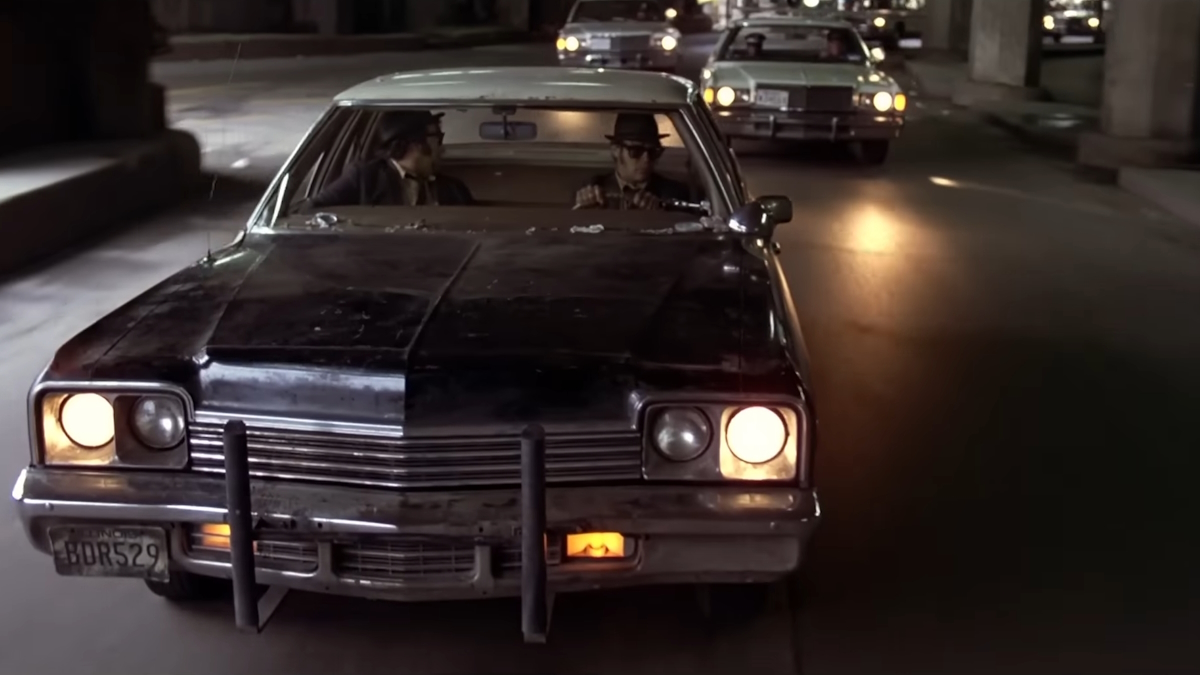
Men on a mission from God need a steed that can help them do the job. Enter: The Bluesmobile, a modded 1974 Dodge Monaco. The model was chosen by writer/star Dan Aykroyd due to his personal opinion that Dodge Monacos were great police cars for the ‘70s. The Bluesmobile as it appears in John Landis’ comedy musical classic sports almost all of its stock parts, except for its loudspeaker, being a Cold War-era air raid siren, heinously strapped to its roof. But more than what’s in the hood is what it’s capable of, from jumping over bridges to flipping backwards in midair. Pretty impressive for a car missing its cigarette lighter.
18. 1958 Plymouth Fury, aka “Christine” (Christine, 1983)
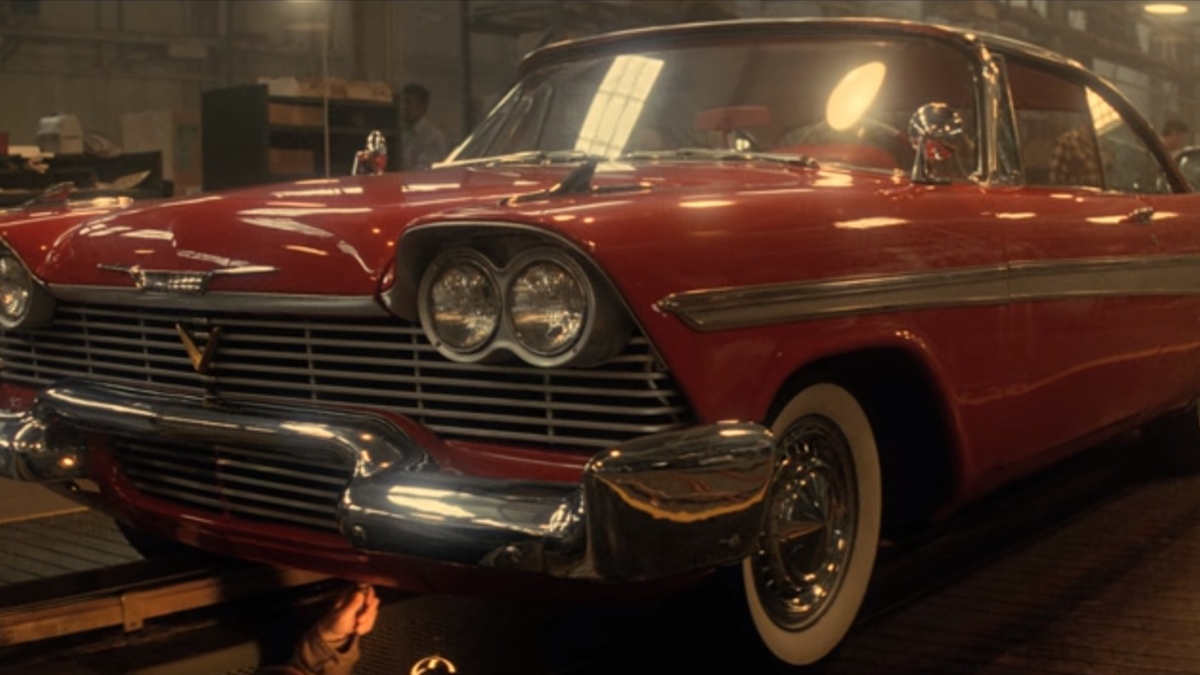
In both Stephen King’s 1983 novel and John Carpenter’s film version, nerdy Arnie Cunningham (Keith Gordon) buys an enigmatic but attractive 1958 Plymouth Fury, a scarlet vixen nicknamed “Christine.” After caring for Christine at a local shared garage, however, Arnie begins to exhibit dangerous behavior including an abrupt surge of confidence and arrogance. Furthermore, death seems to follow Christine – and she appears very overprotective of her new owner. In this chilling tale about the ways a boy’s journey into manhood can go terribly wrong, the dream of having a beautiful car becomes a nightmare.
17. 1992 Ford Explorer XLT UN46 (Jurassic Park, 1993)
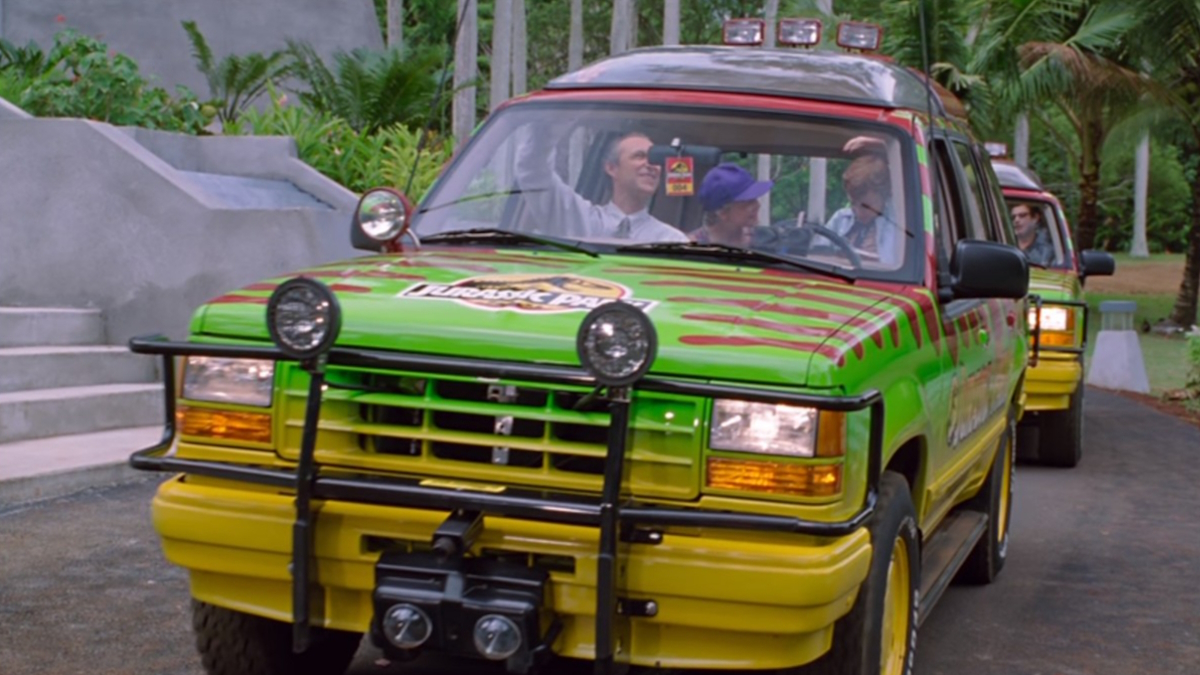
Commonly mistaken to be Jeep, several Ford Explorers were used as park touring vehicles in Steven Spielberg’s sci-fi blockbuster classic Jurassic Park. While author Michael Crichton originally wrote them as Toyota Land Cruisers in his novel, the use of Ford SUVs came out of a deal between the Ford Motor Company and Spielberg himself. In the movie they appear to have self-driving functionality; in reality, Industrial Light & Magic (ILM) crew members modified them so that drivers could control the cars while hiding in the trunks. While Explorers are very common on the road, it’s not every day you see them with Jurassic Park wrap-around branding. When you do, that’s when you know that life has, uh, found a way.
16. 1968 Ford Mustang GT Fastback (Bullit, 1968)
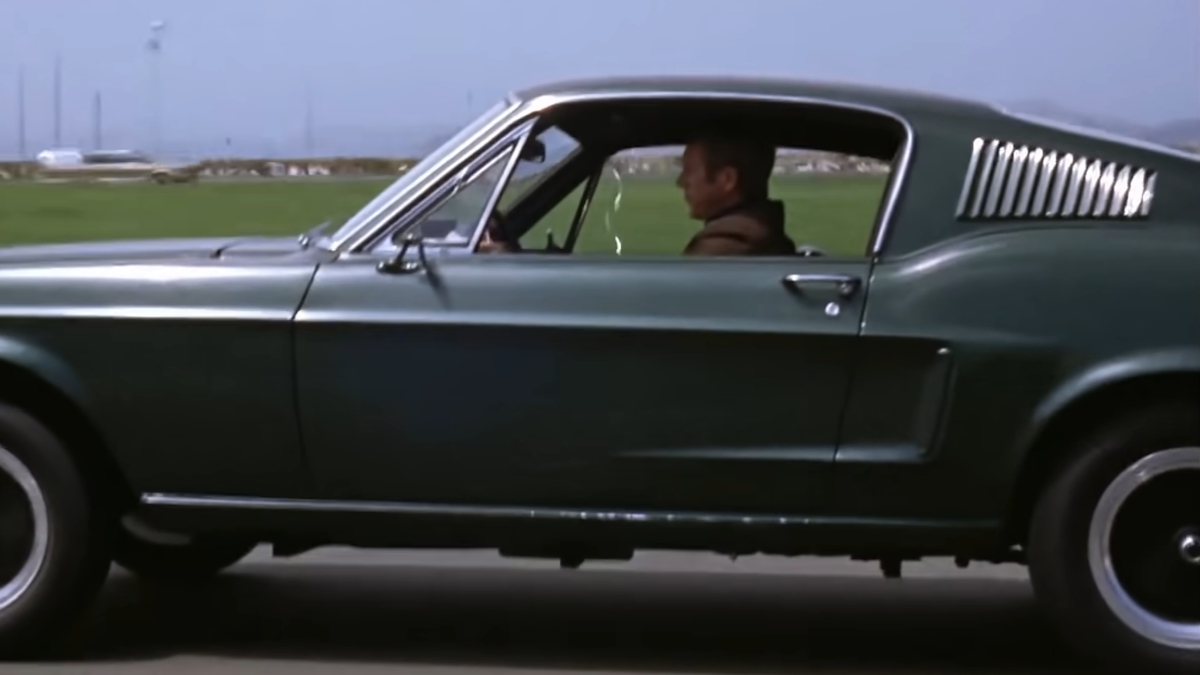
Any movie that uses a Ford Mustang owes a debt to Peter Yates’ action thriller Bullit. Starring Steve McQueen as ruthless San Francisco police detective Lt. Frank Bullit, the movie prominently features a ‘68 Ford Mustang, which Bullit uses to cause mayhem up and down the Bay Area in his hot pursuit of justice. Through its mesmerizing extended chase sequence, Bullit’s Mustang enjoys cultural immortality, being the reason why so many devil-may-care movie characters drive Mustangs.
15. 1959 Cadillac Miller-Meteor Sentinel, aka “Ecto-1” (Ghostbusters, 1984)
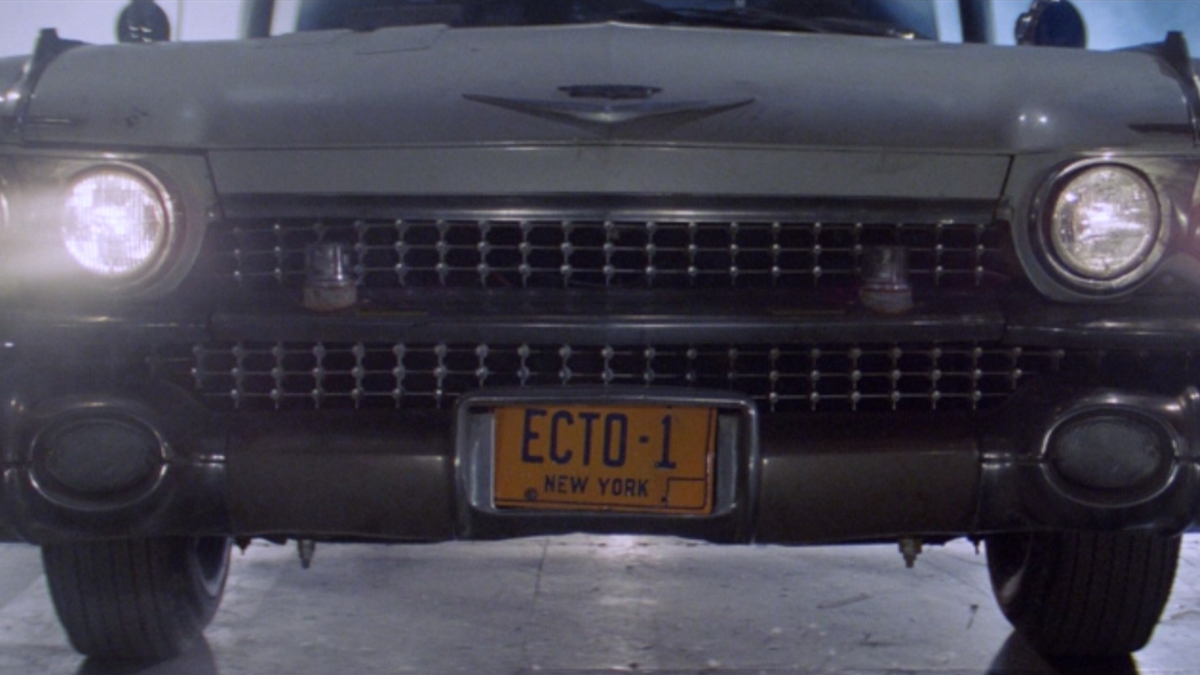
It needs suspension work, shocks, brakes, brake pads, lining, steering box, transmission, rear end, maybe a little wiring… but hey, she’s a beaut. In Ivan Reitman’s Ghostbusters, the start-up ghost hunters ride around New York in a modded 1959 Cadillac combination car. In normal usage the car would be a hearse or an ambulance, which you have to admit is a stroke of genius on the part of the filmmakers. But under the care of the Ghostbusters, it’s their primary mode of transport, with the pull-out carriage in the rear carrying all of their unlicensed nuclear devices. Distinct for its red and white color scheme and a bunch of sheer nonsense on the roof, the Ecto-1 emits a lot of annoying sirens, but when you’ve got a bad ghost problem, you’re glad to hear them. Anyway, you called them!
14. 1971 Volkswagen T2 Microbus (Little Miss Sunshine, 2006)
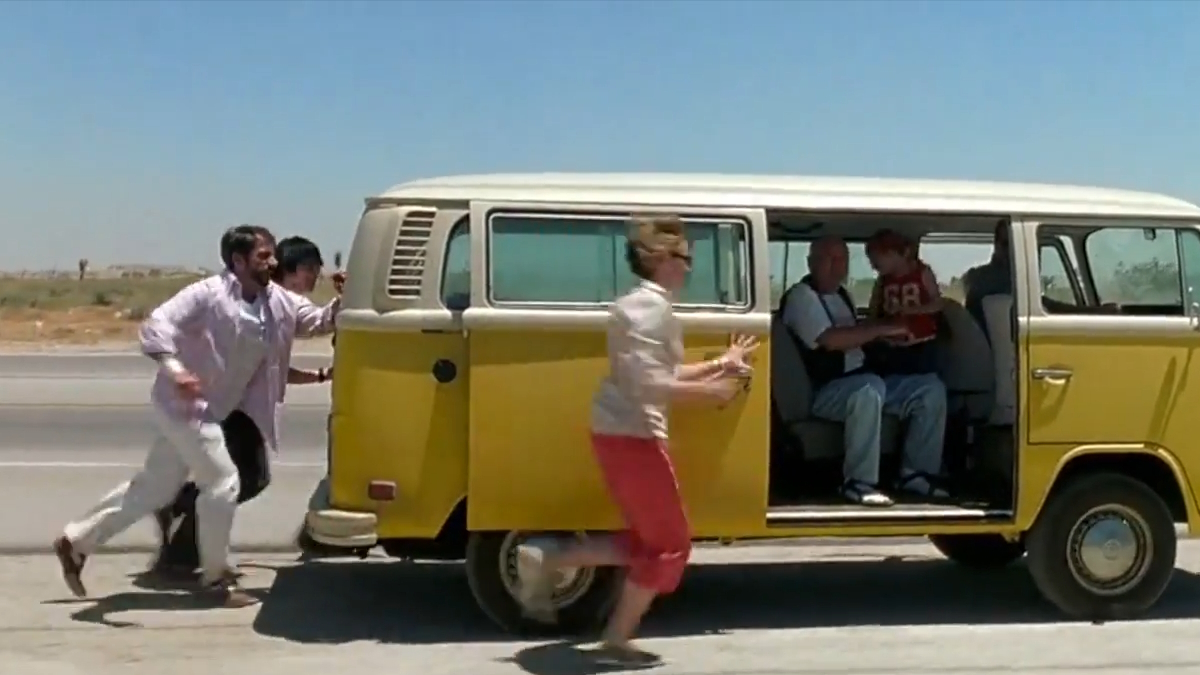
The Volkswagen Type 2, introduced in 1950, is a staple of ‘60s counterculture to the point it boasts the nickname “Hippie van.” But the Type 2 found new cultural relevance through the 2006 indie hit Little Miss Sunshine, being the car the Hoover family take on an 800-mile road trip to enter their youngest, Olive (Abigail Breslin) in a beauty pageant. The T2 was written into the script by screenwriter Michael Ardnt due to its features that made it fitting for a road trip movie, as well as practical for filmmaking. “I remember thinking, it's a road trip, what vehicle are you going to put them in? And [the] VW bus just seems logical, just because you have these high ceilings and these clean sight lines where you can put the camera,” Arndt said in a filmed interview. In July 2006, VW bus owners enjoyed their own screening of the film at the Vineland Drive-In theater in California.
13. The Batmobile (The Batman, 2022)
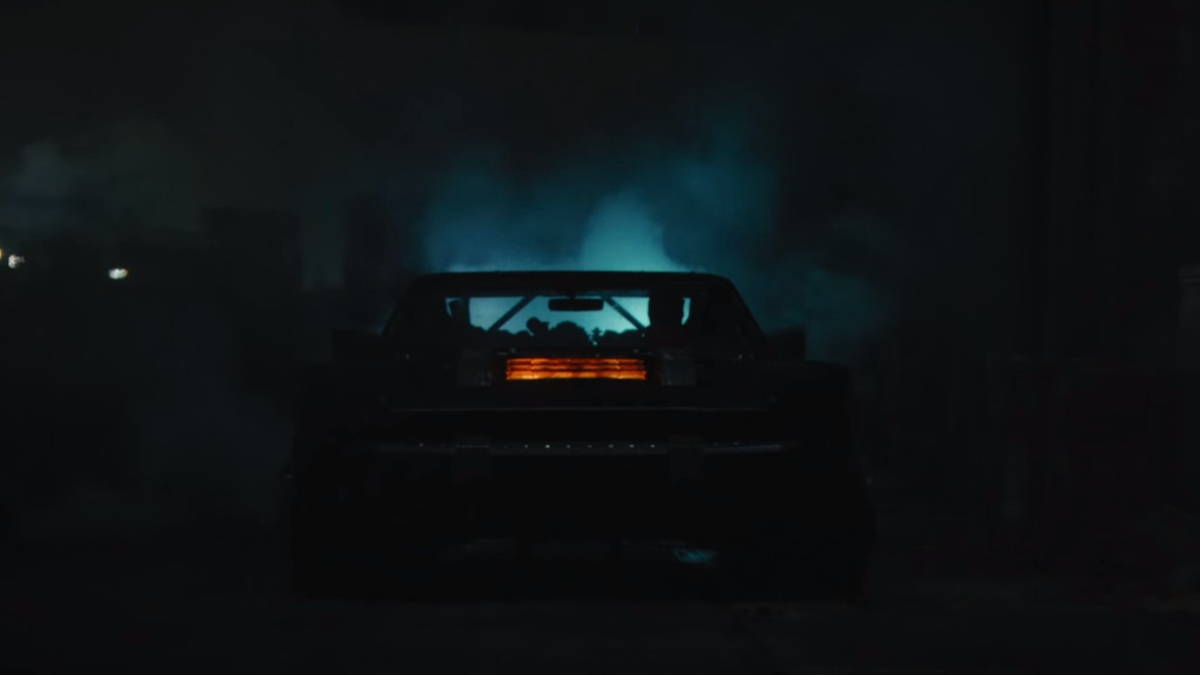
There are many Batmobiles in Batman’s movie history. But one that stands out the most is the one ironically closest to a real car. In Matt Reeves’ The Batman, Robert Pattinson’s version of the DC Comics superhero drives a modified muscle car, a Frankenstein creation that includes the roof of a 1969 Dodge Charger and a Chevrolet V8 engine. Unlike the unreal rides and tank-like designs of Batman movies from before, Reeves’ version is meant to look grounded and handmade, though Reeves still strove to make the car feel like a possessed demon. Inspired by the movie Christine, Reeves said: “I liked the idea of the car itself as a horror figure, making an animalistic appearance to really scare the hell out of the people Batman’s pursuing.”
12. 1948 Ford De Luxe, aka “Greased Lightning” (Grease, 1978)
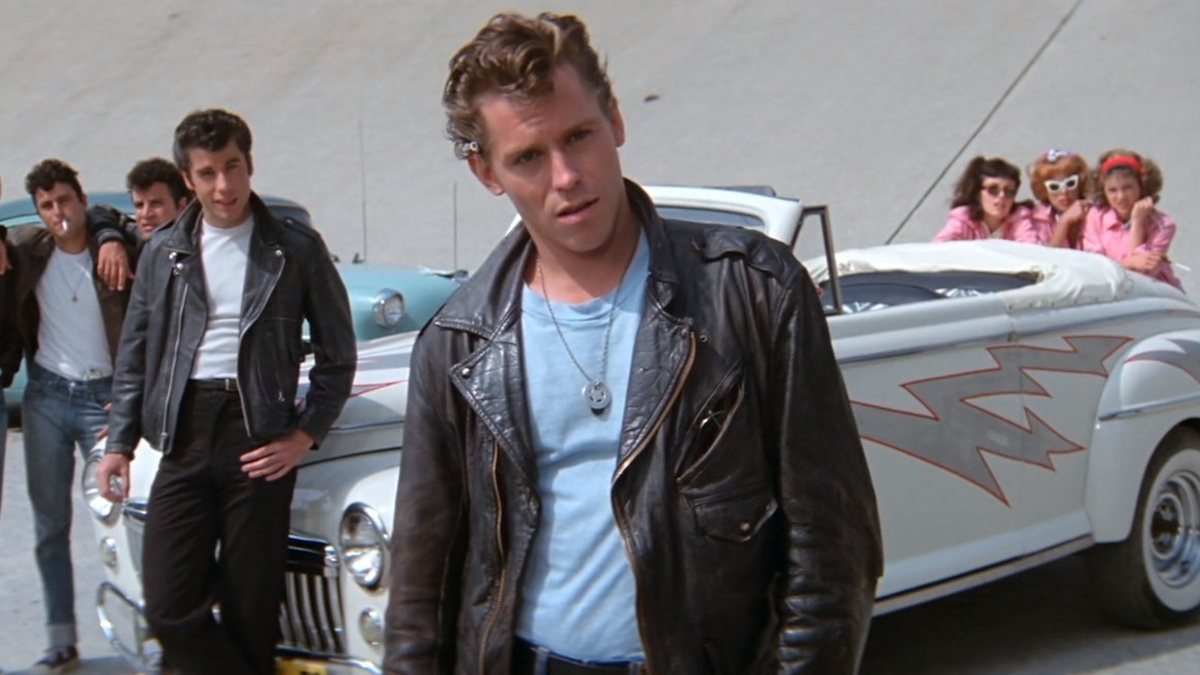
It’s systomatic, hydromatic, ultra-matic – why, it’s Greased Lightning! In the 1978 film version of the stage musical, John Travolta’s Danny Zuko pours his heart and soul into “Greased Lightning,” a souped-up 1948 Ford De Luxe that magically and inexplicably changes from white to red paint. Originally bought by Danny’s friend Kenickie to race other greasers with, it’s ultimately Danny who gets behind the wheel. While there are plenty of iconic cars in movies, none of them have their own theme song. But Greased Lightning does! “Go, Greased Lightning! Go, Greased Lightning!”
11. 2006 Chevrolet Camaro Concept (Transformers, 2007)
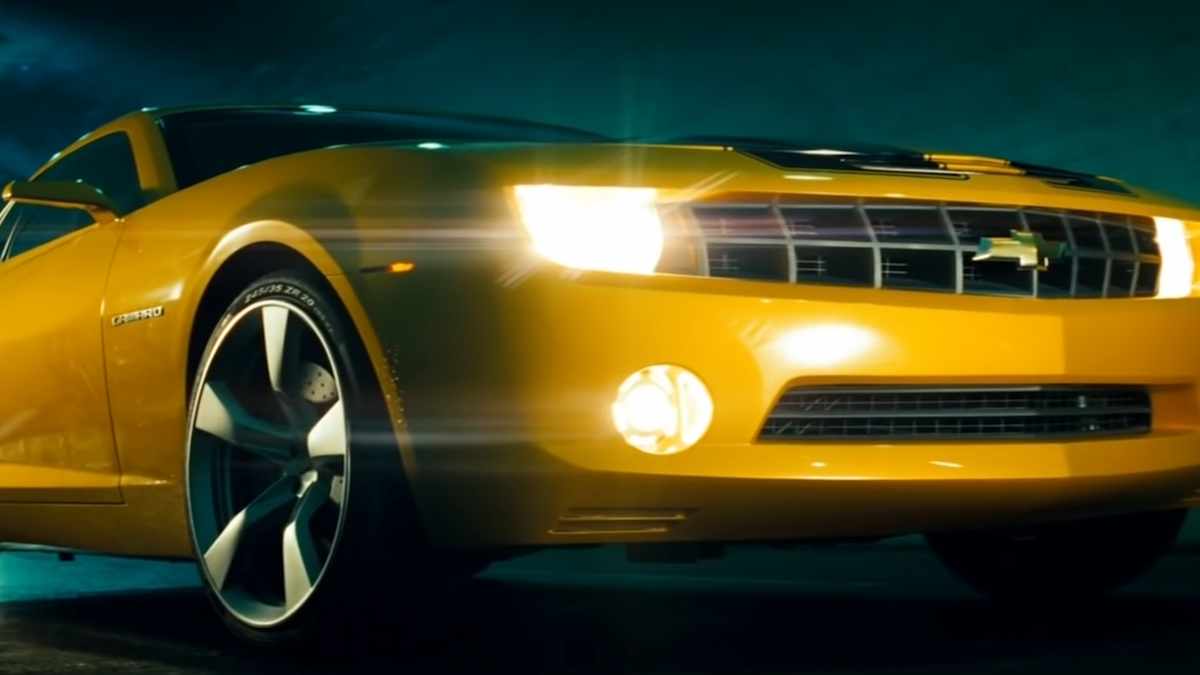
Who wouldn’t want to drive a Transformer? In Michael Bay’s film version of the ‘80s anime, teenager Sam Witwicky (Shia LaBeouf) is desperate to get his first car only to end up with the Autobot scout Bumblebee. Initially appearing as a rusty ‘76 Camaro, Bumblebee gets a wild 21st century upgrade midway through the movie by replicating a then-unavailable fifth generation Chevrolet Camaro. (It was first unveiled a year earlier, at the 2006 North American International Auto Show.) While the general public couldn’t get these Camaros for themselves until 2009, the epic success of Transformers instructed dudes everywhere on what to look for when the time came to buy one. Of course many of them got it in Bumblebee yellow, too.
10. 1967 Austin Mini Cooper S (The Italian Job, 1969)
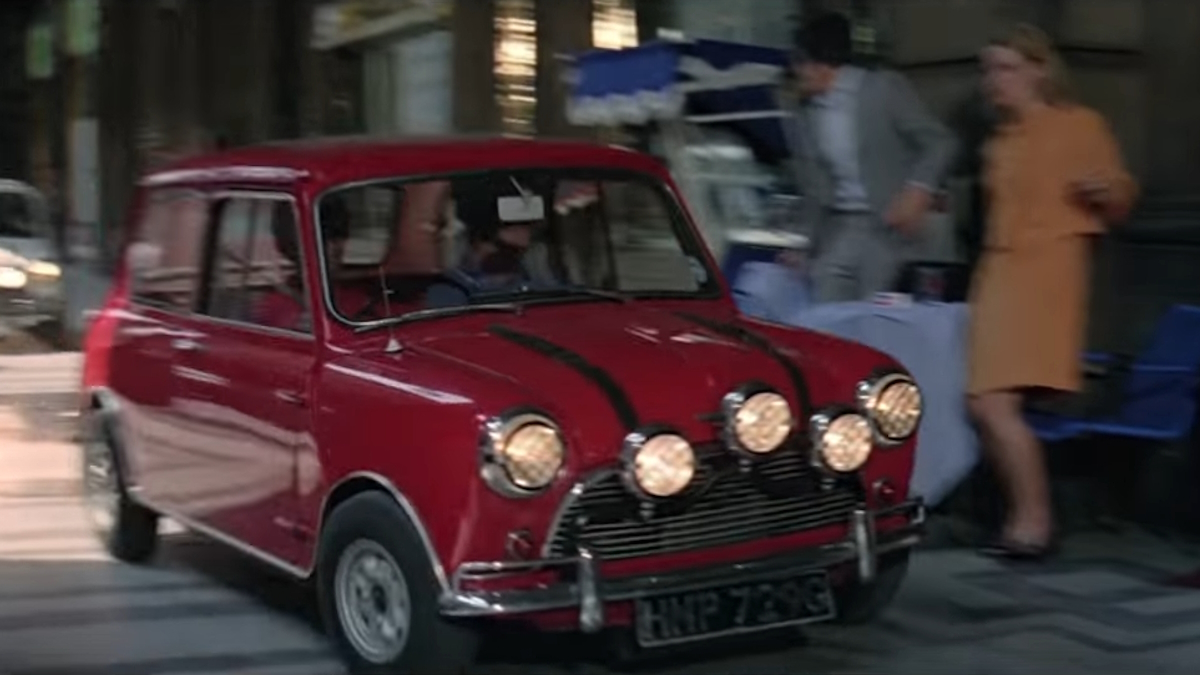
Starring in one of the most elaborate chase scenes of all time is a surefire way to become an unforgettable car. In the iconic British comedy crime movie The Italian Job, several variants of the Austin Mini Cooper S speed around Italy, terrifying pedestrians but amusing audiences by how nimble these tiny fellas can maneuver around tight roads and alleys. While the 2003 Hollywood remake also featured reborn Minis, with model year 1997 and actually modified for the film to become electric vehicles, the Minis seen in the original movie can’t be beat, being so synonymous with British pop culture of that decade.
9. Chitty Chitty Bang Bang (Chitty Chitty Bang Bang, 1968)
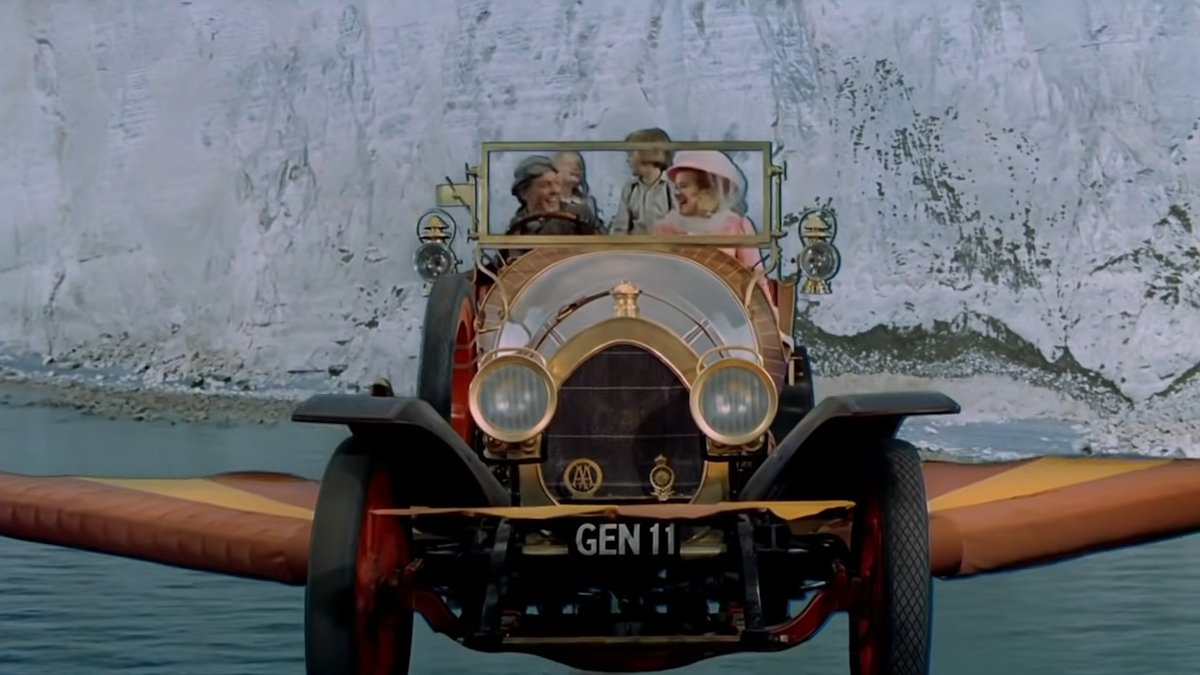
It sounds dirty, and there’s a chance it actually is. But Chitty Chitty Bang Bang is the name of a classic race car featured in James Bond creator Ian Fleming’s children’s book Chitty Chitty Bang Bang, and celebrated 1968 film version starring Dick Van Dyke, about a magical car that can fly. Fleming was inspired by several real-life British racing cars, whose engines were so loud it inspired its name. (There’s also rumors it comes from a bawdy World War I song.) Regardless of where the name originates, Chitty Chitty Bang Bang is a steampunk dream notable for its wood chassis and aeronautical engine. In a 2011 interview with the Los Angeles Times, Dick Van Dyke recalled that the car, which he actually drove for the movie, was “difficult to maneuver,” describing it like trying to steer a battleship.
8. The Gigahorse (Mad Max Fury Road, 2005)
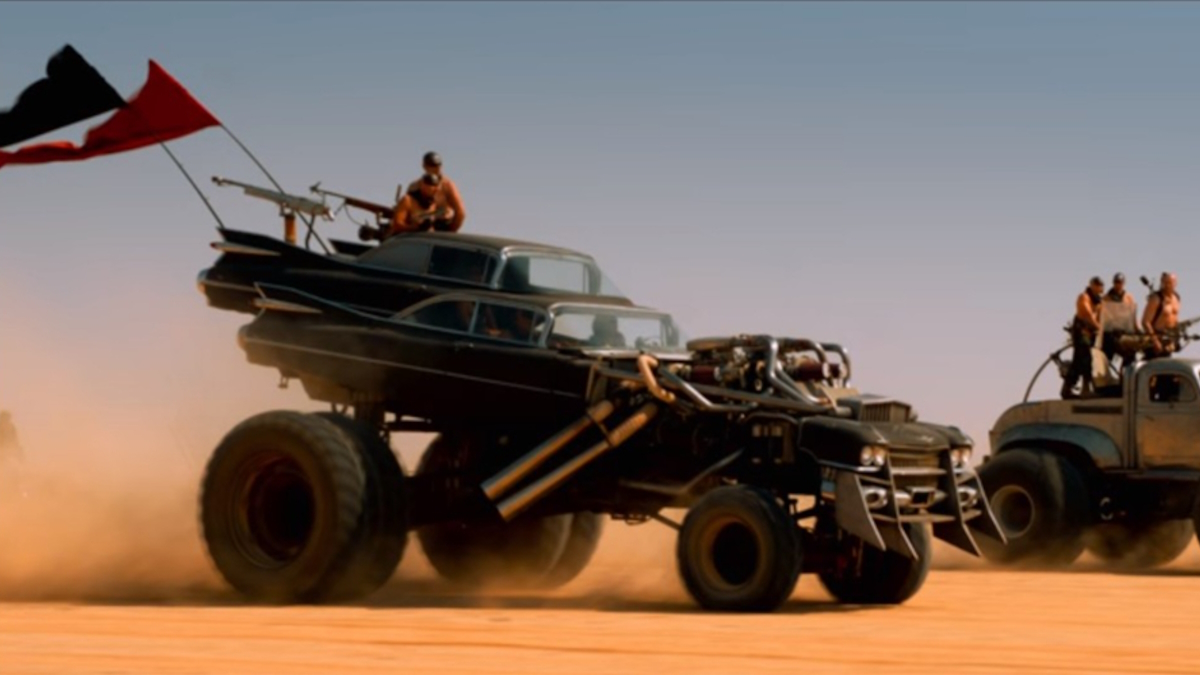
If there is a car that evokes the spirit of heavy metal music, it’s the Gigahorse, the crown jewel of Immortan Joe’s (played by actor Hugh Keays-Byrne) armada and his personal ride in George Miller’s modern classic Mad Max Fury Road. The Gigahorse is made up of 1959 Cadillac Coupe de Villes crudely stacked on top of each other in a most unholy way, plus tractor tires including rear wheels 70 inches in diameter. A monstrosity in every sense of the word, the Gigahorse almost had even more alarming features (like turret guns) that were ultimately scrapped for both practical and in-universe logic reasons. It’s a car that evokes power in the gaudiest way, and terrifying to see coming at you at full speed.
7. 1970 Dodge Charger (The Fast and the Furious)
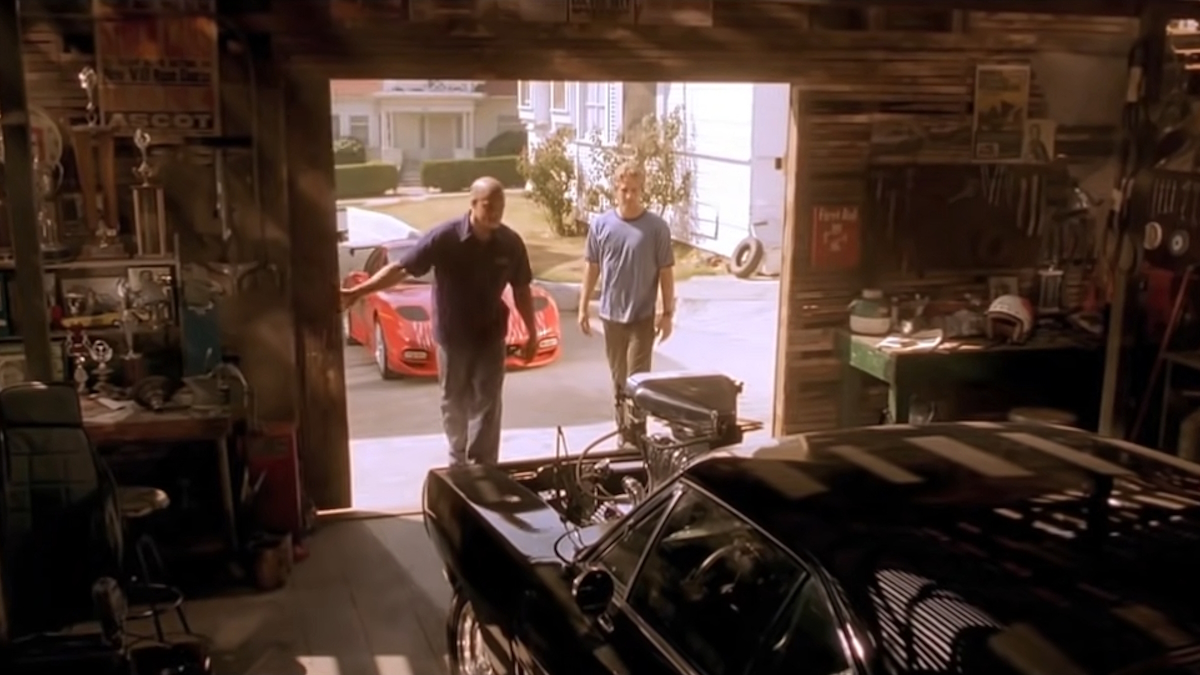
Those who live their lives a quarter mile at a time probably drive a Dodge Charger like Dom. While the “General Lee” from Dukes of Hazzard popularized the Charger, it was Vin Diesel’s Dom Toretto, a mechanic and muscle car faithful, who made it cool for a new generation in 2001’s The Fast and the Furious. While the car got wrecked in a final race against Brian (Paul Walker) at the end of the movie, it has subsequently reappeared in almost every Fast and Furious sequel afterward, taking Dom everywhere to places like Tokyo, London, New York, and even the Arctic. It seems to run on the power of family.
6. 1969 Boss 429 Mustang (John Wick, 2014)
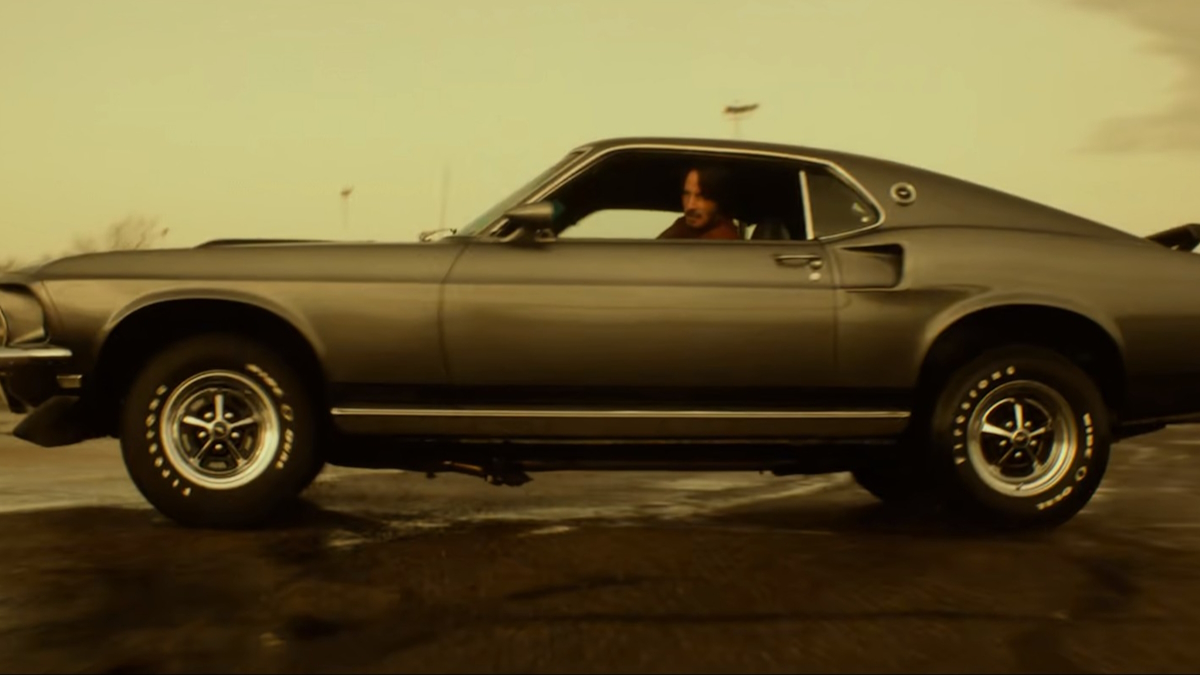
Keanu Reeves’ John Wick isn’t the first man of action to drive a Ford Mustang, but you get the feeling he wouldn’t care if he was. The Boss 429, a very valuable variant of the Ford Mustang, is a prized and powerful car that was mostly made for NASCAR competition and sold in very limited quantities. Because of its rarity, the filmmakers of John Wick actually used a Mustang Mach 1, itself a very formidable car. But onscreen it is the Boss 429, which is an important detail to understand John Wick. The Boss 429 is lethal in its ability, effortlessly cool, and almost one of a kind. Sounds like a certain sharp-dressed assassin, doesn’t it?
5. 1961 Ferrari 250 GT California Spyder (Ferris Bueller’s Day Off, 1986)
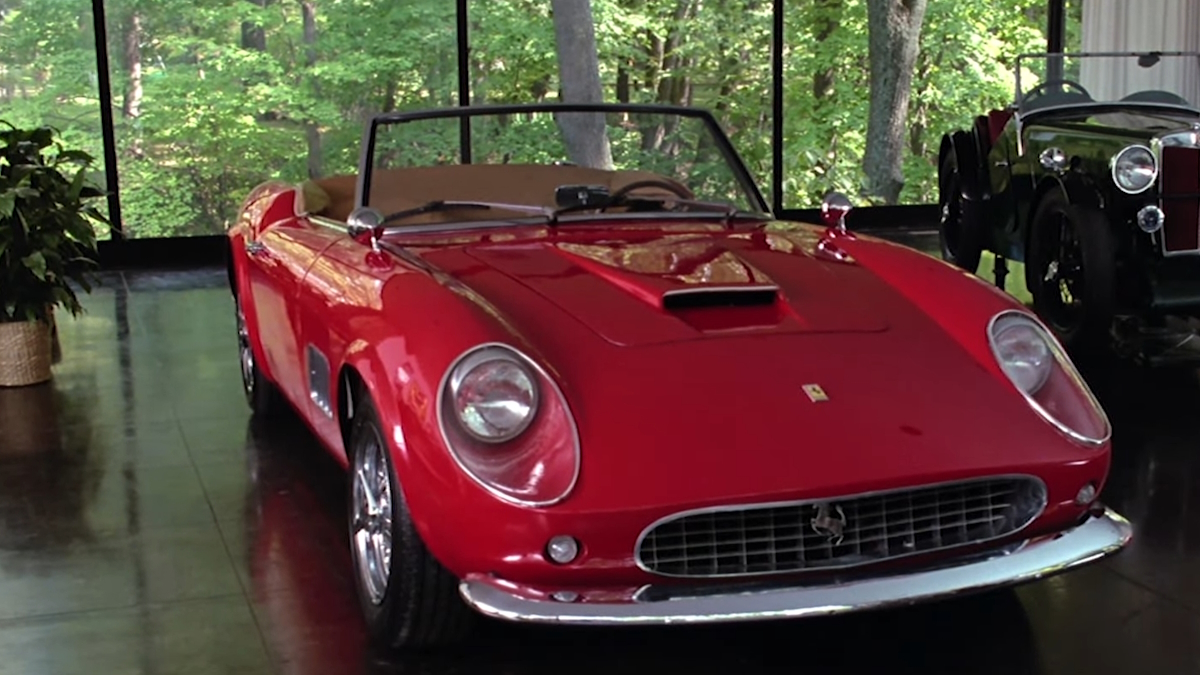
In John Hughes’ iconic teen film Ferris Bueller’s Day Off, Cameron’s dad (who is never seen in the movie) seems to prize his Ferrari more than his own family. And so it becomes a metaphor for the lofty expectations parents burden their kids, along with whatever intrusive forces people let disrupt the sanctity of their homes. The end of the movie is the most memorable part, where – in a desperate attempt to undo the car’s accumulated mileage from Cameron and Ferris’ playing hooky – it ends up backing up and falling out from the elevated garage. That Cameron takes it as an opportunity to confront his father without fear is a bold step forward for him, and a moving lesson for anyone else struck frozen by filial piety. That people see the movie and still revere this iconic Ferrari model anyway shows how much people are willing to miss the point.
4. 1963 Volkswagen Beetle, aka “Herbie the Love Bug” (The Love Bug, 1969)
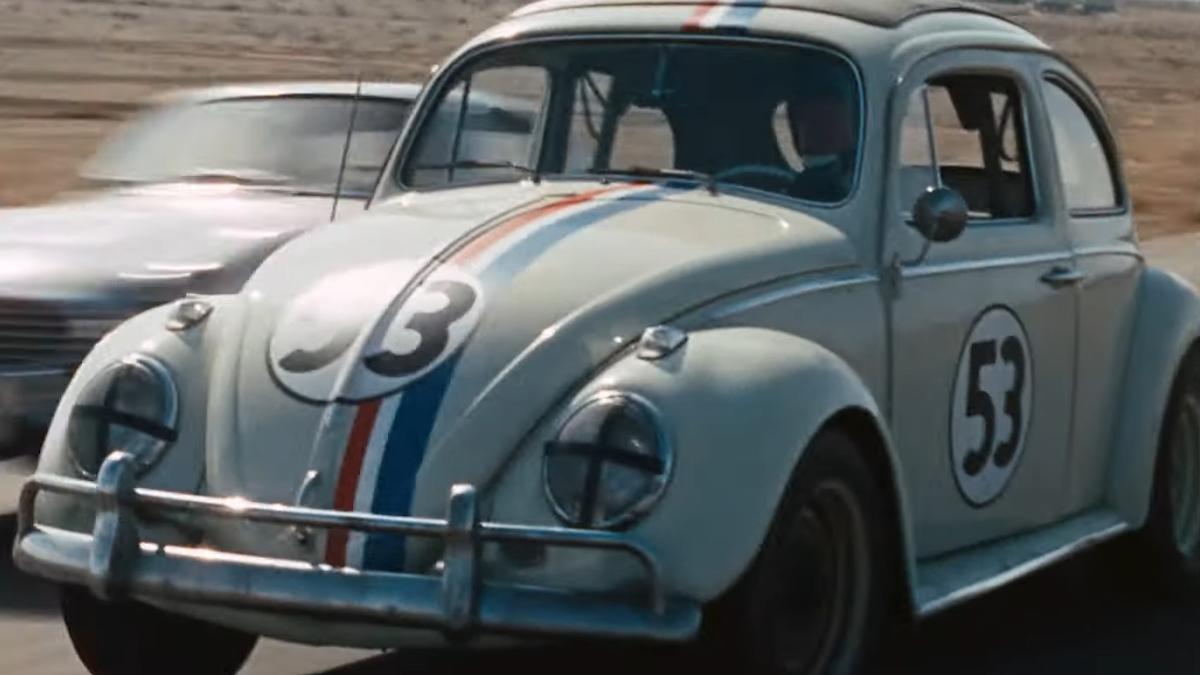
Before Disney’s Cars, there was Herbie the Love Bug, a sentient Volkswagen Beetle. Debuting in the 1968 film The Love Bug, Herbie is a lovable silent character whose personality comes out in his very limited actions. A talented racing vehicle, Herbie is visually distinguishable for his red, white, and blue stripes, pearl white body, and the number 53 painted on his surfaces. While the Volkswagen Beetle enjoyed a prolific history before the movie, The Love Bug and its many sequels make it hard to ignore how much Herbie has made the Beetle a commonplace vehicle on roads everywhere.
3. The Tumbler (Batman Begins, 2005)
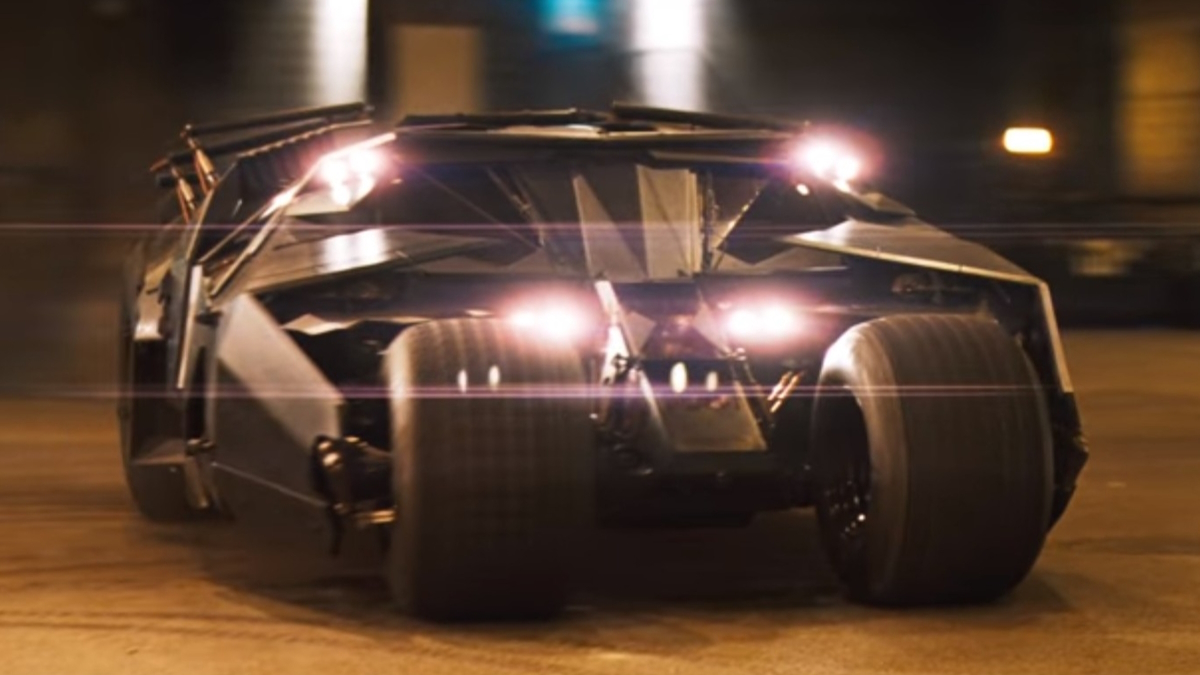
So much about Christopher Nolan’s Batman trilogy can be gleaned by its version of the Batmobile, officially called The Tumbler. In collaboration between Nolan and production designer Nathan Crowley, the Tumbler takes inspiration from the tank-like Batmobile of Frank Miller’s The Dark Knight Returns while grounding it with military functionality. A hybrid of a Lamborghini and a Humvee, the Tumbler runs like a wrecking ball on wheels, yet manages to be one hell of a stealth machine in its ability to disappear from police scanners and even people’s eyesight. A vast departure from the sports car-like Batmobiles of previous movies, the Tumbler proved that Nolan’s Batman was made for the 21st century.
2. DMC DeLorean (Back to the Future trilogy, 1985-1990)
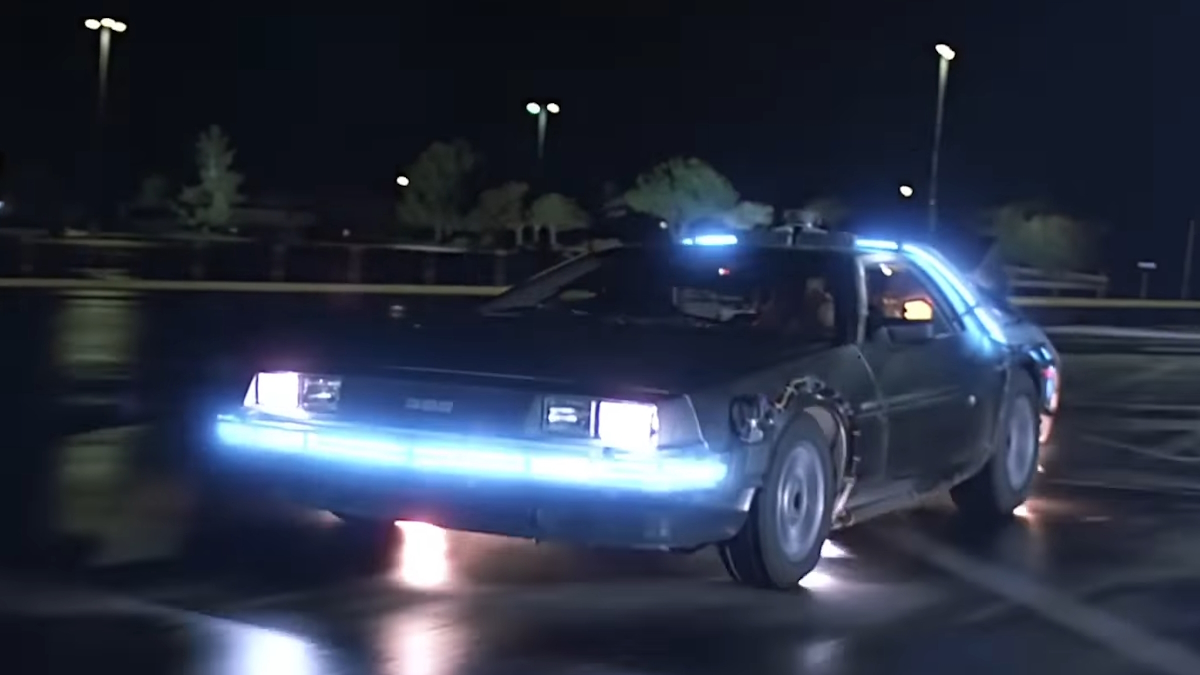
For many, it’s the car in movie history. The DMC DeLorean, a two-seater sports car sometimes called the DMC-12, lived a terribly short lifespan on the commercial market, available only between 1981 and 1982. But today, it enjoys worldwide fame as the car that Doc Brown (Christopher Lloyd) modifies into a time machine, which brings Marty McFly (Michael J. Fox) back and forth in time throughout the Back to the Future trilogy. In the original script, Doc Brown’s time machine was supposed to be a normal device (and was once even a refrigerator). But director Robert Zemeckis ultimately chose the DeLorean due to its unique design and possibilities for mobility. When the Ford Motor Company offered a sponsorship for the filmmakers to use a Mustang, screenwriter and producer Bob Gale nixed the idea, saying: “Doc Brown doesn’t drive a … Mustang!” (He used an expletive.)
1. Aston Martin DB5 (The James Bond series)
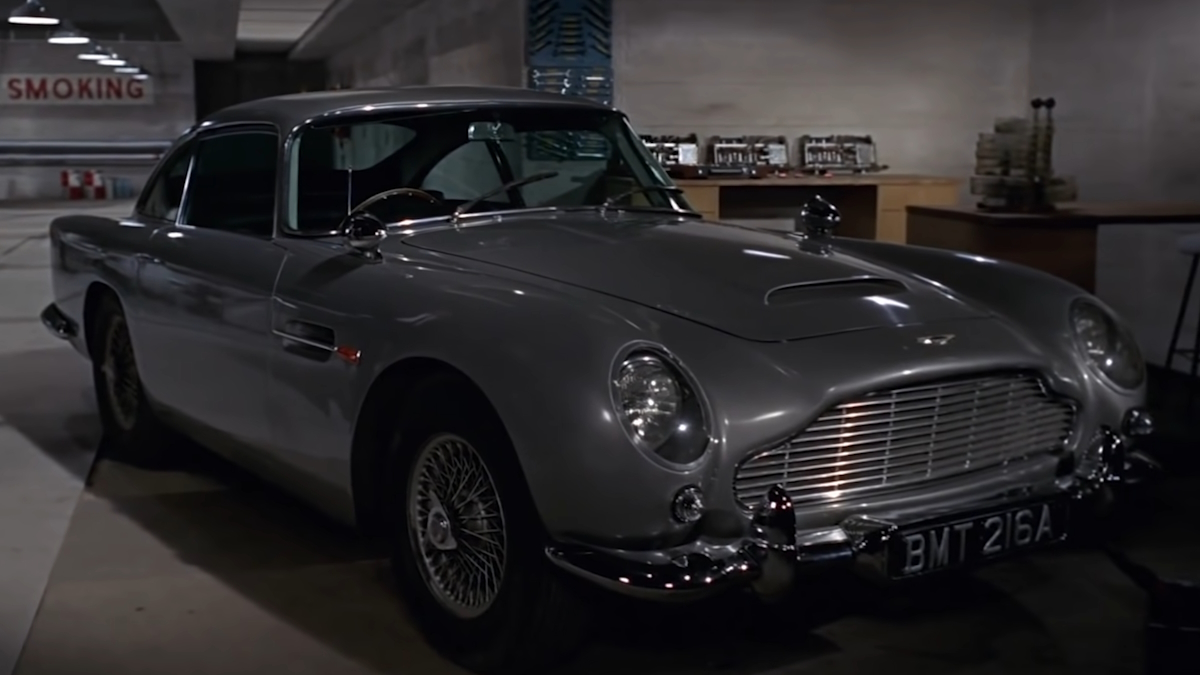
No movie character and no car are so intertwined like James Bond and the Aston Martin. In the original Goldfinger novel by Ian Fleming, James Bond drove the Aston Martin DB3, which Fleming implemented at the suggestion of a fan. When the book was turned into the 1964 movie sequel starring Sean Connery, Bond was given the latest version of the car, the DB5. The rest is history. A beast of a sports car even without all of Q’s modifications, the Aston Martin DB5 exudes all things known to James Bond: luxury, adventure, exoticism. It’s an elegant vehicle that never sacrifices performance. Since appearing in Goldfinger, other Bonds like Pierce Brosnan and Daniel Craig have also gotten behind its wheel. Because while Bond can drive other cars, nothing else comes close for a double-O agent.







